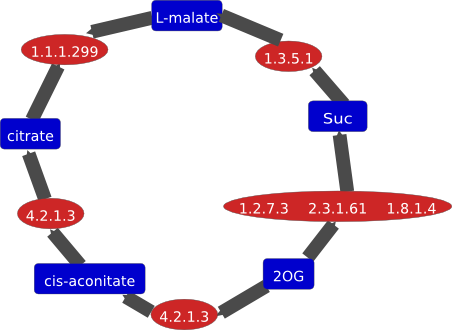EC Number   |
Substrates   |
Organism   |
Products   |
Reversibility   |
|---|
    1.1.5.4 1.1.5.4 | more |
the enzyme is part of both the electron transfer chain and the citric acid cycle |
Helicobacter pylori |
? |
- |
? |
    1.1.5.4 1.1.5.4 | more |
the enzyme is required for growth on acetate and linear terpenes such as citronellol and citronellic acid |
Pseudomonas citronellolis |
? |
- |
? |
    1.1.5.4 1.1.5.4 | more |
the enzyme is required for growth on acetate and linear terpenes such as citronellol and citronellic acid |
Pseudomonas aeruginosa |
? |
- |
? |
    1.1.5.4 1.1.5.4 | more |
a mutant with an interrupted putative mqo gene, in which malate:quinone oxidoreductase, an enzyme involved in the citric acid cycle/glyoxylate cycle, is defective, shows a severe growth defect on ethanol and is unable to grow on acetate |
Pseudomonas aeruginosa |
? |
- |
? |
    1.1.5.4 1.1.5.4 | more |
Corynebacterium glutamicum possesses two types of L-malate dehydrogenase, a membrane-associated malate:quinone oxidoreductase (MQO) and a cytoplasmic malate dehydrogenase (MDH, EC 1.1.1.37). MQO, MDH, and succinate dehydrogenase (SDH) activities are regulated coordinately in response to the carbon and energy source for growth. Compared to growth on glucose, these activities are increased during growth on lactate, pyruvate, or acetate, substrates which require high citric acid cycle activity to sustain growth. MQO is the most important malate dehydrogenase in the physiology of Corynebacterium glutamicum. A mutant with a site-directed deletion in the mqo gene does not grow on minimal medium. Growth can be partially restored in this mutant by addition of the vitamin nicotinamide. In contrast, a double mutant lacking MQO and MDH does not grow even in the presence of nicotinamide. MDH is able to take over the function of MQO in an mqo mutant, but this requires the presence of nicotinamide in the growth medium. It is shown that addition of nicotinamide leads to a higher intracellular pyridine nucleotide concentration, which probably enables MDH to catalyze malate oxidation. Purified MDH catalyzes oxaloacetate reduction much more readily than malate oxidation at physiological pH. In a reconstituted system with isolated membranes and purified MDH, MQO and MDH catalyze the cyclic conversion of malate and oxaloacetate, leading to a net oxidation of NADH. Evidence is presented that this cyclic reaction also takes place in vivo |
Corynebacterium glutamicum |
? |
- |
? |
    1.1.5.4 1.1.5.4 | more |
mutants lacking mqo function grow more slowly in culture than wild-type bacteria when dicarboxylates are the only available carbon source. Mqo may be required by DC3000 to meet nutritional requirements in the apoplast and may provide insight into the mechanisms underlying the important, but poorly understood process of adaptation to the host environment |
Pseudomonas syringae |
? |
- |
? |
    1.1.5.4 1.1.5.4 | more |
NAD-dependent malate dehydrogenase (MDH, EC 1.1.1.37) does not repress mqo expression. MQO and MDH are active at the same time in Escherichia coli. No significant role for MQO in malate oxidation in wild-type Escherichia coli. Comparing growth of the mdh single mutant to that of the double mutant containing mdh and mqo deletions indicates that MQO partly takes over the function of MDH in an mdh mutant |
Escherichia coli |
? |
- |
? |
    1.1.5.4 1.1.5.4 | more |
the loss of malate:quinone oxidoreductase activity down-regulates the flux of the tricarboxylic acid cycle to maintain the redox balance and results in redirection of oxaloacetate into L-lysine biosynthesis |
Corynebacterium glutamicum |
? |
- |
? |
    1.1.5.4 1.1.5.4 | more |
the enzyme shows specificity towards ubiquinone, duroquinone, and dimethyl naphthoquinone in addition to menaquinone. And the enzyme also shows malate dehydrogenase activity, EC 1.1.1.37, overview |
Bacillus sp. (in: Bacteria) |
? |
- |
? |
    1.1.5.4 1.1.5.4 | more |
the enzyme only oxidized disaccharides with reducing-end glucosyl residues, such as lactose, but not monosaccharides |
Pseudomonas taetrolens |
? |
- |
- |





